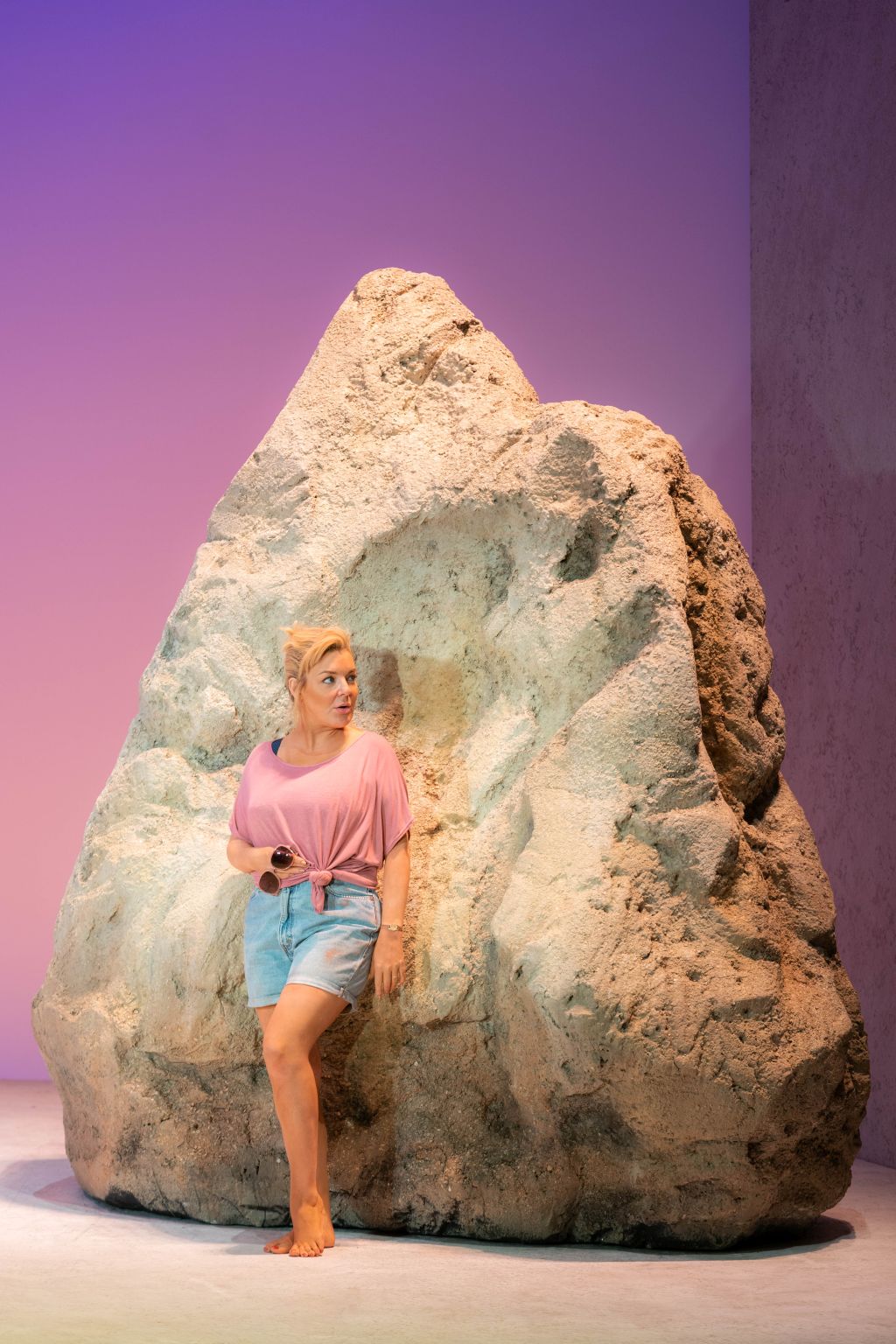Can lightning strike twice? Very much so, when it comes to Shirley Valentine, Willy Russell's much-revived solo play which I saw back in the day with its London and Broadway originator, Pauline Collins, who went on to receive a 1990 Oscar nomination for the film. Now along comes Sheridan Smith, who is very nearly the same age as the unhappy Liverpudlian housewife and mother who, age 42, reluctantly travels to Greece and into a new life.
And, remarkably, Smith not only stands alongside fond memories of Collins in the role but quite often surpasses them. For years, Smith's emotional transparency has been her calling card, across two Olivier Awards and shows as varied as Legally Blonde and Terence Rattigan's Flare Path. That ability to connect instantly and deeply with an audience here pays remarkable dividends, overriding the hoary sections of the text and honoring the rest with a dignity Shirley herself deserves.
 Scarcely has the curtain gone up on Paul Wills's pitch-perfect set before a ready smile from our star clues us into a rapport that continues straight through to the rapturous curtain call. Though Shirley Bradshaw (Valentine is her maiden name) is nominally talking to the wall - and, after the interval, to a rock - Smith pulls a sold-out house into her confidence. Indeed, so invested are we in her narrative that there's not so much as a rustle from the crowd throughout, even if I've not seen as liquored-up a house in a long time: Shirley's onstage quaffing of Riesling must be doing wonders for bar sales.
Scarcely has the curtain gone up on Paul Wills's pitch-perfect set before a ready smile from our star clues us into a rapport that continues straight through to the rapturous curtain call. Though Shirley Bradshaw (Valentine is her maiden name) is nominally talking to the wall - and, after the interval, to a rock - Smith pulls a sold-out house into her confidence. Indeed, so invested are we in her narrative that there's not so much as a rustle from the crowd throughout, even if I've not seen as liquored-up a house in a long time: Shirley's onstage quaffing of Riesling must be doing wonders for bar sales.
Bustling about the kitchen as she chats, Shirley clues us into her dreary domestic life, including a husband, Joe, who sounds borderline abusive and two kids, one of whom comes home to live only to bolt away again soon after. The dramatic engine of the monologue are the tickets to Greece that have been put Shirley's way by a friend, Jane, whose own husband was found in bed with the milkman. (Jane goes on to have her own fling with a "walking groin".) But can housebound Shirley find the strength to break free of her self-described "little life" and embrace the world - and herself? What do you think: if the answer were no, Russell's proto-feminist exercise wouldn't have a second half.
As before, one is aware of an author at times pandering to the gallery: the clitoris jokes barely landed then and don't at all now, and one is aware of a sameness to the construction of the humour: comparisons abound, whether "sex is like Sainsbury's" or "marriage is like the Middle East". (You can discover the payoff to these similes for yourselves.)
But so winning and warm is Smith that you surrender to Shirley, in all her fun and fragility, too. Maybe it's Smith's background in Ibsen (she has played Hedda at the Old Vic) but I more than once thought of Nora in A Doll's House in terms of Shirley's determination to slam the door shut on her repressive, restricted existence in England and start again in a Greece whose azure-blue skies, in Lucy Carter's mutable lighting, have you drowning in warmth. (The change of setting post-interval here elicits the impromptu cheers it always has.)
Smith is a great mimic. She does full justice to Shirley's hilarious reminiscence of her son's rather vocal participation in the school nativity play (a milieu this performer must know full well after fronting the recent revival of Andrew Lloyd Webber's Joseph and the Amazing Technicolor Dreamcoat), not to mention an acquaintance from years ago who turns out not to be an air hostess but something else altogether. She later encapsulates in an instant those English tourists abroad, like Dougie and Jeanette, who find "Greece too Greek".
But the actress also trawls the play's pain more deeply than I have seen, guided presumably towards the darkness with the help of her protean director, Matthew Dunster, whose credits range from Martin McDonagh to Danny Robins and more. You're fully aware of the psychic toll early on that has led to Shirley's self-hatred and to her intuition, upon finding romance of sorts with the dishy Costas (Tom Conti's role in the film), that this gorgeous local may be less sincere than he seems. No matter: even if he isn't her soulmate, Greece itself may be.
Indeed, her reference to "Saint Joan of the fitted units" notwithstanding, an equal comparison could be made to Beckett's valiant Winnie in Happy Days, who gabs gaily into the void, busying herself all the while. The difference is that Winnie exists to be swallowed whole, whereas Shirley moves into the light, aware that "most of us die long before we're dead" but that one solution to that truism is, very simply, to choose life.
One doesn't have to follow the tabloids to be aware that Smith herself has had notable ups and downs along the way, my acquaintanceship with her onstage dating back to her scene-stealing turn in Into the Woods at the Donmar when she was still a teenager. Shirley Valentine ranks with her very best work, which is saying something, and when she wiped away tears of gratitude at the curtain call, the entire house seemed to raise a loving glass her direction by way of response.















Add comment